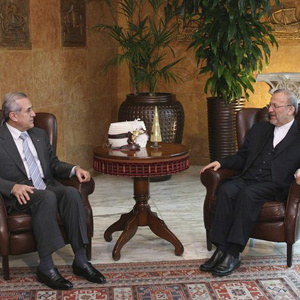Tehran and Beirut towards Warmer Relations
By Hamid Reza Dehqani Poudeh, head of the Center for Middle East Studies of Iranian Ministry of Foreign Affairs

Since the outbreak of political crisis in Lebanon between 8th of March and 14th of March camps over the constitution, election of the president and the new cabinet, Iran has supported internal dialogue between the diverse Lebanese groups as the most fruitful option.
It played a constructive role during Doha talks and if it wasn’t for Iran mediation, the gaping wound in Lebanese politics would be left unhealed. A new cabinet had to be introduced after the last parliamentary election which gave victory to the pro-West 14th of March alliance.
Considering the composition of the legislative body (with the margin between 8th of March and 14th of March camps) and the unique nature of Lebanese politics, only a coalition cabinet could meet the demands of all parties involved. Inside Lebanon, talk of the post-election days was the friction between Saudi Arabia and Syria.
The Lebanese believed that only an agreement between these two leading Arab countries could end the crisis in the country. Mutual visits of Bashar Assad and King Abdullah to Jeddah and Damascus raised hopes that the new cabinet will finally find its members. Iran also supported the formation of a national unity government since it regarded this as the ideal of every Lebanese citizen.
Shortly after the formation of the new cabinet, the Iranian foreign minister visited Lebanon to assure the Lebanese government that Iran is still behind the Lebanese nation, government and resistance. Mottaki’s visit was the best move to convince the Lebanese that Iran appreciates the solidarity, security and territorial integrity of the country.
For the future, mutual relations is the most important matter to be regarded by Iran and Lebanon in their negotiations. Iran has always favored strong diplomatic ties with Lebanon. Lebanese politicians have been always welcomed in Iran, as the reception of former presidents and prime ministers of Lebanon testifies. To this, Saad Hariri is no exception. It is expected that the new prime minister of Lebanon visits Iran in near future to start a new era of friendly relations between the two countries. Regional issues such as expansion of ties with Arab countries and support for the rights of Palestinians seem to be the key topics in Tehran-Beirut negotiations.
Hariri made a historical visit to Syria a few days Mottaki’s trip to Beirut. In this regard, Tehran has always supported cordial relations between Beirut and Damascus and believes that with the shared historical background of the two neighboring countries Syria and Lebanon, Middle East will be the entity benefiting most.
It played a constructive role during Doha talks and if it wasn’t for Iran mediation, the gaping wound in Lebanese politics would be left unhealed. A new cabinet had to be introduced after the last parliamentary election which gave victory to the pro-West 14th of March alliance.
Considering the composition of the legislative body (with the margin between 8th of March and 14th of March camps) and the unique nature of Lebanese politics, only a coalition cabinet could meet the demands of all parties involved. Inside Lebanon, talk of the post-election days was the friction between Saudi Arabia and Syria.
The Lebanese believed that only an agreement between these two leading Arab countries could end the crisis in the country. Mutual visits of Bashar Assad and King Abdullah to Jeddah and Damascus raised hopes that the new cabinet will finally find its members. Iran also supported the formation of a national unity government since it regarded this as the ideal of every Lebanese citizen.
Shortly after the formation of the new cabinet, the Iranian foreign minister visited Lebanon to assure the Lebanese government that Iran is still behind the Lebanese nation, government and resistance. Mottaki’s visit was the best move to convince the Lebanese that Iran appreciates the solidarity, security and territorial integrity of the country.
For the future, mutual relations is the most important matter to be regarded by Iran and Lebanon in their negotiations. Iran has always favored strong diplomatic ties with Lebanon. Lebanese politicians have been always welcomed in Iran, as the reception of former presidents and prime ministers of Lebanon testifies. To this, Saad Hariri is no exception. It is expected that the new prime minister of Lebanon visits Iran in near future to start a new era of friendly relations between the two countries. Regional issues such as expansion of ties with Arab countries and support for the rights of Palestinians seem to be the key topics in Tehran-Beirut negotiations.
Hariri made a historical visit to Syria a few days Mottaki’s trip to Beirut. In this regard, Tehran has always supported cordial relations between Beirut and Damascus and believes that with the shared historical background of the two neighboring countries Syria and Lebanon, Middle East will be the entity benefiting most.

